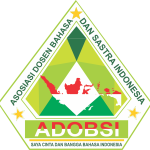Perubahan Tradisi Marpege-Pege Masyarakat Batak Angkola di Padangmatinggi Lestari, Sumatera Utara
Abstract
Batak angkola is one of the Batak tribes that settled in Padangsidimpuan and surrounding areas. This region is divided into several villages, one of which is Padangmatinggi Lestari. The Angkola Batak community in Padangmatinggi Lestari has unique traditions and is still preserved today, including marpege-pege. In general, this tradition is only carried out at the groom's house. In Padangmatinggi Lestari, the marpege-pege tradition has changed in its implementation. This study aims to analyze changes in the marpege-pege tradition of the Angkola Batak community in Padangmatinggi Lestari. The method used in this research is qualitative research method. The approach used is a semiotic approach with the challenge and response theory coined by Arnold J. Toynbee. The results of this study show that there are two changes in the marpege-pege tradition in Padangmatinggi Lestari. First, the marpege-pege tradition may be held by the bride-to-be. This change originated from an incident experienced by a traditional leader in Padangmatinggi Lestari who did not have a son. As a result, he could not hold this tradition when his daughter was getting married. This incident then made the traditional leaders agree that marpege-pege could also be done by the bride-to-be. Secondly, sipulut, which is the specialty food during marpege-pege, can be replaced with compote. This change was made by the customary king to maintain the health of the invited guests, especially the elderly who cannot consume sipulut because they have mag.
Keywords
Full Text:
PDFReferences
Andarini, D., Hidayat, H., & Hajar, I. (2019). Tradisi marpege-pege dalam upacara adat perkawinan Batak Angkola Padangsidimpuan. Jurnal Antropologi Sumatera, 17(2), 56–58. https://doi.org/10.24114/jas.v17i1
Harahap, S. (2015). Budaya marpege-pege dalam perspektif sosiologi: Suatu kajian sosiologi atas tindakan budaya masyarakat Batak Angkola. Jurnal Ilmiah Ilmu-Ilmu Sosial, 14(2), 111–124.
Hasibuan, A. S., Cristy, S. N., Perangin-angin, A. B., & Chunliu, L. (2024). Makna semiotika perangkat adat dalam tradisi marpege-pege pada masyarakat Batak Angkola Padangsidimpuan. Literasi: Jurnal Ilmiah Pendidikan Bahasa, Sastra Indonesia dan Daerah, 14(1), 426–440. https://doi.org/10.23969/literasi.v14i1
Hasibuan, A. S., & Setia, E. (2023). Marpege-pege: A tradition in Batak Angkola Padangsidimpuan. Tradition and Modernity of Humanity, 3(2), 42–47.
Katutu, A. (2018). Berbagai metodologi dalam penelitian pendidikan dan manajemen (Vol. I). Bone: Gunadarma Ilmu. http://repositori.iain-bone.ac.id/3/1/Berbagai%20Metodologi%20dalam%20Penelitian.pdf
Koentjaraningrat. (2005). Kebudayaan, mentalitas dan pembangunan. Jakarta: PT Gramedia Pustaka Utama.
Kurniawan, P. (2016). Memahami pertautan agama dan budaya: Studi terhadap tradisi marpege-pege di Batak Angkola. Yurisprudentia: Jurnal Hukum Ekonomi, 2(2), 35–53. https://doi.org/10.24952/yurisprudentia.v2i2
Kusuma, Y. (2014). Pendidikan Islam dan tuntutan zaman. Ta’limuna, 3(1), 68–79. https://doi.org/10.32478/ta.v3i1.103
Manullang, B., & Saragi, T. (2010). Kearifan lokal masyarakat Batak Angkola dalam perspektif pedagogi adat: Sebuah upaya melestarikan kearifan lokal. Jurnal Pendidikan Progresif, 1(1), 33–46.
Mesini, M. (2021). Realitas tradisi marpege-pege di Kabupaten Tapanuli Selatan. Darul Ilmi: Jurnal Ilmu Kependidikan dan Keislaman, 9(1), 14–25. https://doi.org/10.24952/di.v9i1.3404
Moleong, L. J. (2021). Metodologi penelitian kualitatif (Ed. ke-40). Bandung: Remaja Rosdakarya.
Ritonga, S. K. (2020). Islamisasi tradisi: Studi analisis terhadap Martahi Marpegepege pada Batak Angkola dalam perspektif hukum Islam. Tazkir: Jurnal Penelitian Ilmu-Ilmu Sosial dan Keislaman, 6(1), 35–54. https://doi.org/10.24952/tazkir.v6i1.2361
Rofiq, A. (2019). Tradisi slametan Jawa dalam perspektif pendidikan Islam. Attaqwa: Jurnal Ilmu Pendidikan Islam, 15(2), 93–107. https://doi.org/10.54069/attaqwa.v15i2.13
Subchi, I. (2018). Pengantar antropologi (Ed. ke-1). Jakarta: Rajawali Pers.
Wahyu, & Nasrullah. (2012). Surat Tumbaga Holing 1. Medan: CV Mitra.
Refbacks
- There are currently no refbacks.






